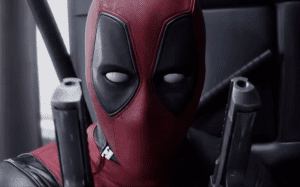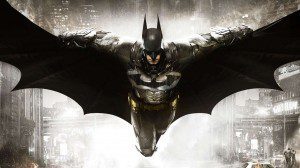
Deadpool, the latest cinematic superhero movie from Marvel, opened big this weekend, banking around $135 million over three days and blasting past all sorts of box office records. But as he’d be the first to admit, the movie’s red-suited protagonist (played by Ryan Reynolds) isn’t particularly heroic.
Near the end of Deadpool (obvious spoiler warning here), our titular protagonist listens to a heartfelt speech from Colossus, a hunk of chrome encouraging him not to kill the enemy staring down the barrel of Deadpool’s gun.
“Four or five moments,” Colossus says. “Four or five moments—that’s all it takes to be a hero. Everyone thinks it’s a full-time job. Wake up a hero. Brush your teeth a hero. Go to work a hero. Not true. Over a lifetime there are only four or five moments that really matter. Moments when you’re offered a choice to make a sacrifice, conquer a flaw, save a friend—spare an enemy. In these moments everything else falls away.”
BLAM! Thus endeth the lesson.
In this scene, a high moral dilemma is played for laughs: When you have no morals, of course, there is no dilemma. But for me, the question at the core of this confrontation is a powerful one—one shaped, in part, by faith.

I’m playing through Batman: Arkham Knight—a game that allows me to play as my favorite superhero. Batman, famously, does not kill; it’s one of the reasons why I like the guy so much. And yet playing the game, where I’m sometimes chauffeuring decades-long enemies like Penguin and Firefly back to jail for what, to Batman, would be the umpteenth time, you do wonder whether it gets old. Whether there are times when even Batman wonders whether Gotham’s gallery of killers could use some terminal justice.
“How many times have we done this, Batman?” Two-Face taunts him in the Gotham City lockup. “You put us behind bars only for us to escape. Your life is meaningless. A charade.”
In the comics, Batman does grapple with this issue from time to time, as does his longtime ally, Commissioner Gordon. But before they take a step too far, they always manage to reel each other back. They recognize that that line—the line between taking the life of an enemy and sparing it—is a critical one. Cross that line, they tell each other, and it becomes harder to separate the good guys from the bad.
Deadpool suggests otherwise. So have others. In the latest trailer for the upcoming season of Netflix’s Daredevil (beginning March 18), we meet one of them—The Punisher. He, like Deadpool, believes in terminal justice: That killers should not be saved, that wrath should visit them like an angel of death. Meanwhile Daredevil, like Batman, has sworn not to kill, and has taken that oath at least in part because of his Catholic faith. That conflict looks like it’ll be a central premise in Season Two—and will delve into that conflict in a far more compelling way than Colossus and Deadpool did.
https://www.youtube.com/watch?v=m5_A0Wx0jU4“You hit ’em and they get back up,” Frank Castle, a.k.a. the Punisher, tells Daredevil. “I hit ’em and they stay down!”
The battle-weary Batman of my game, the grizzled Dark Knight who’s been fighting crime in Gotham since before we were born, could perhaps appreciate the finality of the Punisher’s ethos, the exclamation mark at the end of Deadpool’s gun. You put us behind bars only to escape, Batman’s told. His work is never done.
Superheroes like Batman live in an Ecclesiastical world—much as we do. “This is an evil in all that is done under the sun,” we’re told in Ecclesiastes 9:3, “that the same event happens to all. Also, the hearts of the children of man are full of evil, and madness is in their hearts while they live, and after that they go to the dead.” Batman sees this truth every night. Daredevil sees it. “Your life is meaningless,” Two-Face says. Ecclesiastes says the same thing. Often.
But then, one verse later, we read this: “But he who is joined with all the living has hope.”
“They say that when you kill a man you not only take away what he was, but all he will ever be,” we hear in the Batman graphic novel Hush. But where there’s life, there’s hope. Hope for a better future. Hope to be a better person.
There’s no promise of redemption in living—but there is the possibility. And holding onto that possibility, in the midst of all the evil under the sun, is an act of optimism. An act, in some ways, of faith—faith that maybe God still has plans for a soul so twisted, a life so wasted. Just like He has for us.
You hit ’em and they get back up, the Punisher says. Because maybe—just maybe—they get up better.












